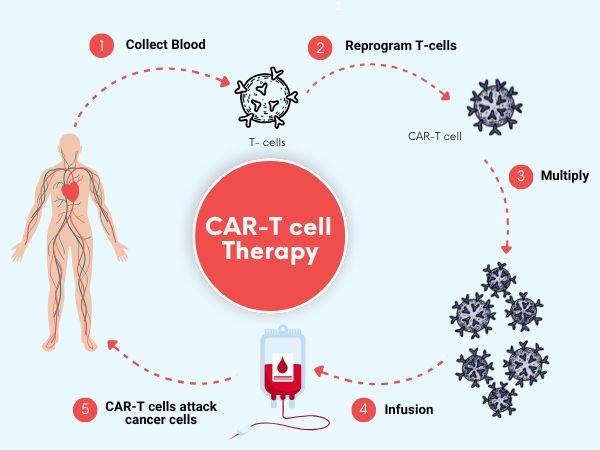What Happens When CAR T-Cell Therapy Fails? Exploring the Challenges and Next Steps

Treatment for cancer has been transformed by chimeric antigen receptor T-cell (CAR T-cell) therapy, especially for blood malignancies like lymphoma and leukemia. But even with its revolutionary success, not everyone responds well to CAR T-cell therapy. Patients and healthcare providers may face serious difficulties if the treatment is unsuccessful.
Antigen escape, in which the cancer cells lose or alter the target antigen (such as CD19) that the CAR T-cells are intended to identify, is one of the most frequent reasons for failure. The CAR T-cells cannot successfully combat the cancer cells without this particular target.
CAR T-cell activity may occasionally be inhibited by the tumor microenvironment. The suppressive microenvironment found in solid tumors, in particular, might hinder immune cell function and result in decreased efficacy.
The therapy may not reach its full potential if patients suffer from significant toxicities, such as cytokine release syndrome (CRS) or neurological adverse effects, which require treatment cessation.
Inadequate CAR T-Cell Persistence: CAR T-cells must remain in the body for a certain amount of time in order to completely destroy cancer cells. Relapse may occur in certain situations when the T-cells are unable to produce long-term benefits.
Next Steps After CAR T-Cell Therapy Fails
Patients may still benefit from other immunotherapies if CAR T-cells don't work. Immune Checkpoint inhibitors, such as CTLA-4 or PD-1 inhibitors, are options that help strengthen the body's defenses against cancer. Hematopoietic stem cell transplantation (HSCT), commonly referred to as a bone marrow transplant, may be an option for individuals with hematologic malignancies. Especially following CAR T-cell failure, this technique can aid in immune system restoration and provide a possibility for remission.
Although CAR T-cell therapy has revolutionized cancer treatment, some patients face the difficult reality of its failure. Patients and their healthcare teams can benefit from knowing the causes of therapy failure and investigating the next course of action, whether it be supportive care, clinical trials, or alternative medicines. In order to increase the effectiveness of CAR T-cell treatment and create fresh approaches to get over its drawbacks, more patients will eventually have hope thanks to ongoing research.
FOR MORE INFORMATION VISIT OUR OFFICIAL SITE :- https://www.edhacare.com/treatments/cancer/car-t-cell-therapy
- Art
- Causes
- Crafts
- Dance
- Drinks
- Film
- Fitness
- Food
- Jocuri
- Gardening
- Health
- Home
- Literature
- Music
- Networking
- Alte
- Party
- Religion
- Shopping
- Sports
- Theater
- Wellness


